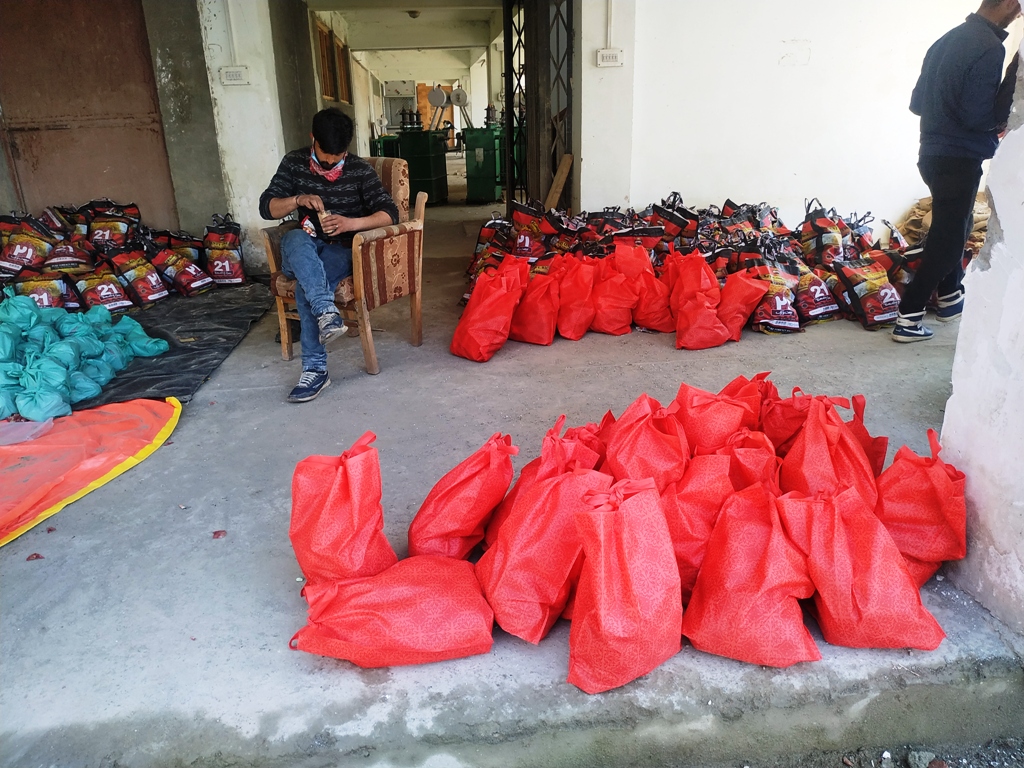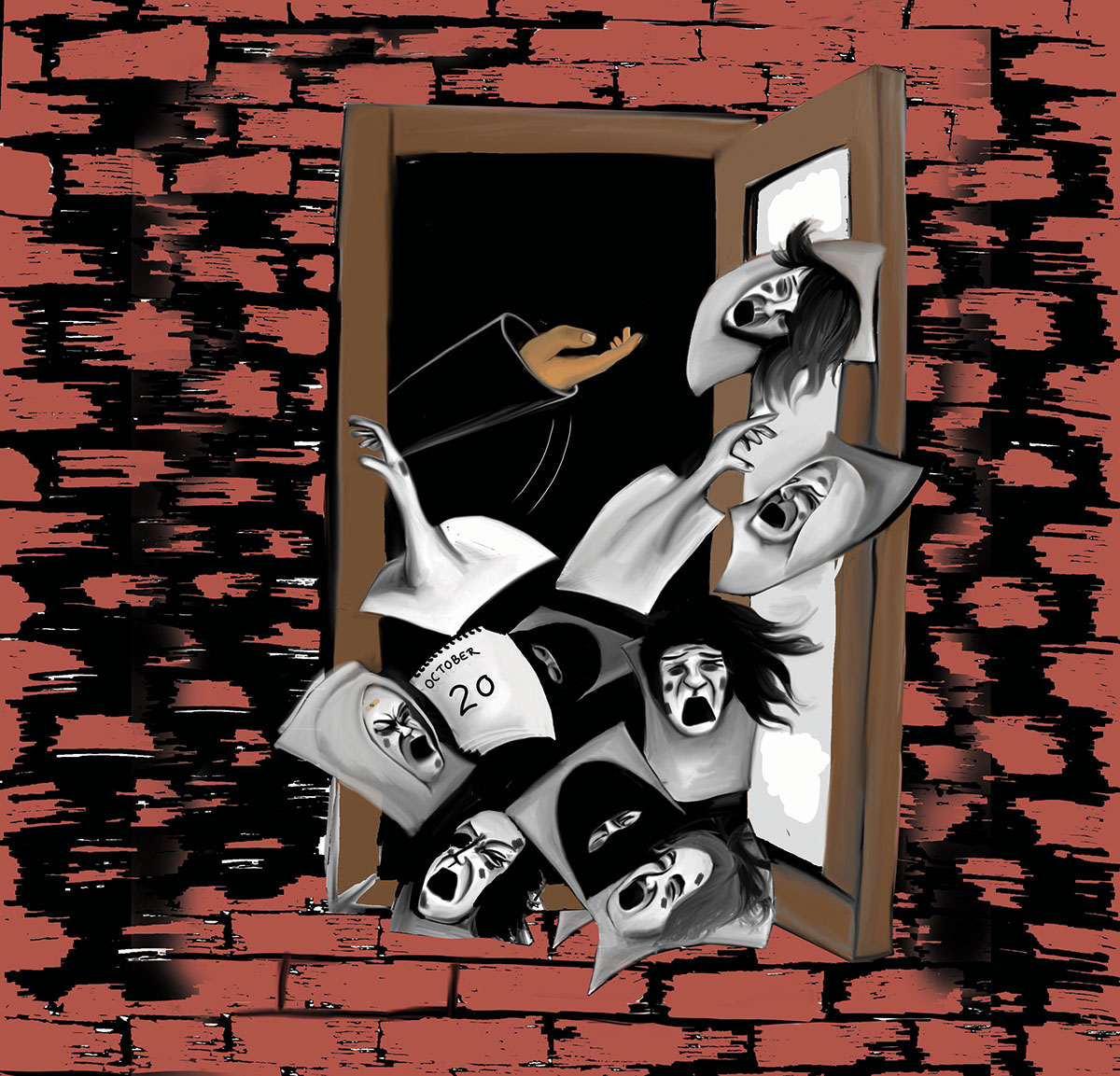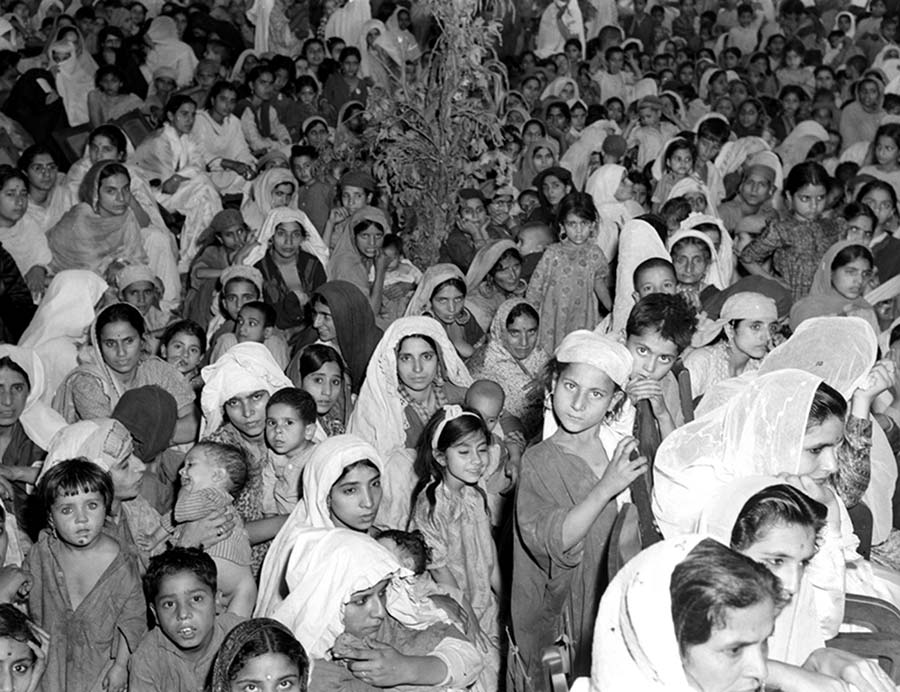Women depending on almsgiving by households to feed their families can’t visit them due to Covid-19 crisis. They desperately need help, reports Saima Bhat

Creased face with a blank expression. Withered and worried, she looks a decade older than her actual age. In her late sixties, Mugli Begum is the lone bread earner of her family.
She doesn’t remember how long she has been working. For her, it has been ages. But a glance out of the corner of eye at her bedridden husband takes her back to eighties. She remembers the ordeal started when her husband Muhammad Yousuf met with an accident.
On his way back home from work, Yousuf, a labourer fell from the rooftop of a bus. He was shifted to Bone and Joint Hospital where he was operated upon immediately. The news shattered his wife and three daughters.
Devastated, Mugli left her daughters with a neighbour and rushed to see her husband at the hospital.. The doctors treating Yousuf told her that his spinal cord was damaged and recovery will take time. However, the doctors were categorical in saying “there is no way to reverse the damage.”
The initial timeframe for recovery was three months. As Yousuf remained glued to the bed in the hospital, the family was disturbed completely. Tending to husband, Mugli was concerned about her daughters back home. Desperately in need of money to feed daughters and fetch medicines for her husband, she had nowhere to go.
“My brothers were also labourers so they could not help me with money. But they took my daughters to their home. They were generous enough to feed them. It at least eased my one burden.”
But the problem for struggling wife was to manage the medicines, though few were provided free of cost by the doctors.
At the crossroads, Mugli had difficulty deciding the course of action. With her extended stay in the hospital, she had made a friend, wife of another patient in the same ward. While discussing the problem, her friend suggested Mugli to seek help from the surrounding locality.
Initially shocked over the suggestion of going out like a beggar, Mugli then 30, eventually had to settle down on this option only. “Begging was never a choice. I know it is seen as a curse in our society but at the same time I had no other option,” Mugli said.
“I covered my face to ensure nobody knowing me or my husband sees me”.
Hesitantly, she crossed the bridge and went into the old Barzulla. Conscious of her cover, she did not know how to start until she entered a house. Once inside, she was lucky to meet a woman. “I didn’t know how to beg. I couldn’t tell her for five minutes what I wanted. She stopped and asked me if I was alright. It burst me into tears and I shared my ordeal.”

Mugli remembers the woman gave her Rs 10. “She made me understand that the society is out to help people in distress and you need not to shy away from seeking the genuine help,” she said..
The woman introduced Mugli to her neighbours. In the following days, Mugli got the required help and also developed a personal bond with the female folk of the area.
After more than three months, Yousuf was discharged. Not able to walk, doctors suggested going for physiotherapy. “Doctors told me he needs physiotherapy but I lacked the resources to go to the hospital every day,” she said. “l believe they lied to me. Actually it was a failed surgery, otherwise, I have seen many patients recovering in the same shifa khana after that.”
= Back home at Narbal, a peripheral area of extended Srinagar city, Mugli and Yousuf got their minor daughters back to their two-room house. “The problem was how to run the family now and at the same time bear the cost of the treatment,” she said.
When the money ran out, they faced the prospect of going hungry. Alleviating the hardships of the family became the goal of her existence. She decided to go out and work for well-to-do families, like cleaning food grains. It would fetch her Rs 20 per household. She requested extra work and also took along leftover food and used clothes. With time, Mugli was a common name in her nearby areas of HMT, Qamarwari and Shalteng, where she works at different households.
After being discharged from the hospital, the treatment of Yousuf continued and finally his one leg was amputated.
Struggling with survival with bedridden husband and growing daughters, Mugli decided to visit Barzulla again. She felt comfortable about sharing her problems with females in the area. “When I thought of seeking help again, my first stop was Barzulla,” she said.
She started visiting the area around Shab-e-Qadr and Eid-ul-Adha. Her bond with the women there has strengthened. They area wait for her visit. The new generation of the girls too have sympathy for her and help her in their own way. “In this area, I go to at least fifty houses. As per their affordability, they give me from Rs 100 to 1000 on every visit and in addition extra meat of Qurbani on Eid Al Adha. They keep their used clothes also for me.”
This twice a year help of around Rs 50000 in addition to her regular work, Mugli says, sufficed her needs back home. “Earlier people used to give me less money but my Allah has been gracious to them, they increased my share.”

Subsequently, Mugli married off her daughters. But as the destiny had in store, the eldest one was sent back by her husband along with two daughters. “He was a drunkard. He used to beat her. I asked him to give her divorce but he doesn’t do that,” she said.
In August 2019, when whole Kashmir was under siege and no vehicular traffic movement was allowed, Mugli managed to visit Barzulla on the second day of Eid Al Adha. “All of them were surprised to see me. I walked some distance and also got a lift by passing vehicles. I had to take this risk otherwise my family would have gone hungry.”
This time, however, the pandemic has shattered Mugli. With no work to do in the neighbourhood, her possible visit this Ramdhan seems impossible. On the first day of fasting, Mugli had borrowed a mobile phone to call her favourite woman in the area, Hajra. She conveyed her inability to come and Hajra expressed her helplessness to reach out with the help.
“She doesn’t have a bank account; otherwise we could have transferred some amount. Her hope is to come and take whatever Allah has destined for her from this area,” said Hajra. “This virus has dashed hopes of manly like Mugli.”
Unlike Mugli, Zeba is lucky. Her husband is working as a labourer and she herself goes to a local private school as a helper. Paid Rs 800 as monthly wage, her four children study in the same school, free of cost. A family of six, it gets difficult to manage when her husband doesn’t get a day of work.
“See we live in Kashmir and everybody knows how many days a labourer gets to work due to the situation, particularly after 2008. Schools also are shut. There have been times when my school administration didn’t pay me anything and then on strikes, my husband was also home,” said Zeba. “In such circumstances, you can understand our plight”.
Though she doesn’t have to pay for the tuition fee, she said there are other expenses including books and uniform which she has to manage.
Forced by the circumstances, she goes to the former staff of the same school to see if she could be of some help on holidays. “Former staff, because they won’t tell anybody that I work for them.”
Besides she says, she regularly visits them on the occasions of Eid. “Trust me that is the only income that saves my family otherwise the situation is such that we may have to sleep empty stomach. I don’t beg but I ask them for sadqai fitr and eidi.”
Not able to move around since the Coronavirus outbreak, Zeba is concerned about how to have her share on this Eid. “Even if I were able to move, the situation is not right to enter anybody’s house. It is a threat,” she said.“This Eid we may have to do without mutton.”
Struggling with her hunch back and old age, Gulshan, lovingly called Maasi is a widow since last 30 years. Her Husband, Ghulam Rasool died of a stroke in the early nineties. A resident of the old city, she was engaged on a temporary basis in a middle school of the area.
Supporting family of six, including her four daughters and mother-in-law, has been tough for Gulshan. Her daughters dropped out of school. The principal of the school, Zubair Ahmad, used to give her extra money out of his own pocket. That helped her to sustain. One day, Ahmad was transferred to another school and Gulshan lost the support.
As few months passed in desperation, one day, Gulshan took her daughter along and went to see Ahmad at his home. The family made her comfortable and asked her to join for lunch. Thereafter she would visit the family on specific occasions. Not only Ahmad, his brothers living in the same compound, too started supporting Gulshan.
In the following years, the families shifted to other places. But Gulshan had all the addresses. She would now visit them in Ramzaan only. The affluent Ahmad and his relatives used to help her almost for the whole year, besides giving her money for medicines or other essentials.
Gulshan never used to ask for anything but the families knew her needs.
“Maasi always visited in the holy month,” said Shabeena, daughter of Ahmad.
This year, Shabeena said, is a difficult one for the old woman. “The problem is even we don’t know her address. It was always that she used to come”.















